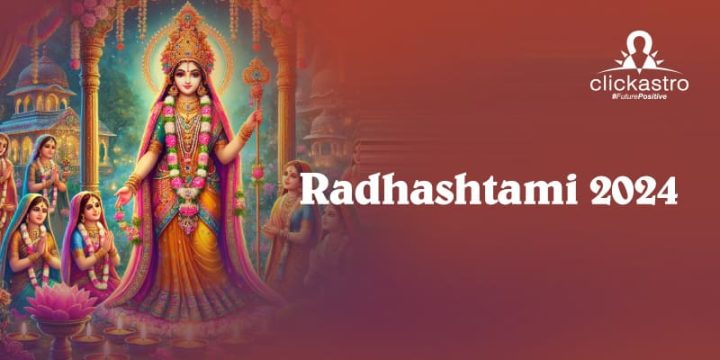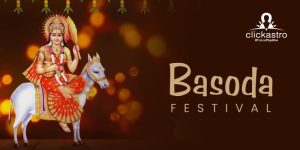Introduction
Radha Ashtami honours the birth of Shri Radha Rani, the consort of Lord Krishna. Radha Rani is venerated as an incarnation of Goddess Lakshmi, embodying the virtues of devotion, love, and spiritual dedication. Celebrated on the eighth day (Ashtami) of the
Shukla Paksha in the month of Bhadrapada, this festival usually falls in August or September according to the
Gregorian calendar.
Radha Ashtami 2024 falls on Wednesday, 11th September.
Radha Ashtami, also known as Radhashtami or Radha Jayanti, is marked by fervent prayers, devotional singing, and elaborate rituals in temples, especially in Mathura, Vrindavan, and Barsana—places intrinsically linked to Radha and Krishna. The festival not only highlights the love between Radha and Krishna but also serves as a reminder of the spiritual union between the individual soul and the supreme consciousness.
Radha Ashtami 2024 Tithi Timings
- Sunrise – September 11, 06:16 AM
- Sunset – September 11, 06:30 PM.
- Ashtami Tithi Timings – September 10, 11:12 PM – September 11, 11:47 PM
The Significance of Radha Ashtami
Radha Ashtami is celebrated on the eighth day (Ashtami) of the Shukla Paksha, the bright fortnight of the moon, in the Hindu month of Bhadrapada. This date comes 15 days after
Janmashtami, the birth anniversary of Lord Krishna. The timing of Radha Ashtami, closely following Janmashtami, highlights the deep and intrinsic connection between Radha and Krishna, emphasizing their inseparable bond in Hindu tradition.
The significance of Radha Ashtami extends far beyond just marking the birth of Radha Rani. Radha is revered as the epitome of pure, selfless love and unwavering devotion to Lord Krishna. Her love is seen as the highest form of bhakti (devotion), free from any expectations or desires, representing an ideal that many devotees aspire to. This day is a celebration of this divine love, which transcends the physical world and symbolizes the union of the individual soul (Jivatma) with the supreme soul (Paramatma).
Radha Rani’s love for Krishna is not just a romantic or emotional attachment; it is a spiritual connection that embodies the deepest form of devotion. Her unwavering dedication to Krishna is a model of spiritual love that goes beyond the limitations of the material world. This festival is, therefore, an occasion for devotees to reflect on the values of love, devotion, and spiritual unity.
The celebration of Radha Ashtami is marked by various rituals, including fasting, singing devotional songs, and performing
special pujas. Devotees, particularly in regions like Vrindavan and Barsana, gather in large numbers to worship Radha Rani and seek her blessings. The festival serves as a reminder of the spiritual ideals that Radha represents, encouraging devotees to cultivate similar qualities of selfless love and devotion in their own lives.
Why is Radha Ashtami Celebrated?
Radha Ashtami celebrates Radha’s unparalleled love and devotion to Lord Krishna. The festival is a time for devotees to reflect on the divine bond between Radha and Krishna, which is viewed as a representation of the union between the individual soul and the supreme soul. The celebration of Radha Ashtami is marked by special prayers, rituals, and festivities, with the devotees visiting temples to offer prayers, sing hymns, and engage in devotional activities.
ISKCON temples worldwide play a significant role in celebrating Radha Ashtami. The day is filled with various devotional activities such as kirtans, bhajans, and special offerings to Radha and Krishna. The celebrations in Barsana, Radha Rani’s birthplace, are particularly notable, where the entire town immerses itself in the joyous festivities, reflecting the deep reverence and affection devotees have for Radha Rani. Through these celebrations, Radha Ashtami becomes an occasion to reaffirm one’s devotion and seek spiritual growth by emulating Radha Rani’s exemplary love and dedication.
The Story of Radha Ashtami
The birth of Radha Rani, the beloved consort of Lord Krishna, is shrouded in mystery and captivating legends, making her story a source of devotion and spiritual reflection. One of the most well-known legends narrates that King Vrishbhanu, a noble and pious ruler, discovered Radha as a baby girl under extraordinary circumstances. While bathing in the sacred waters of the Yamuna River, King Vrishbhanu saw a radiant lotus flower floating on the water. To his astonishment, he found a beautiful baby girl lying on the lotus, glowing with a divine light. Overwhelmed with joy and reverence, the childless king and his wife, Queen Kirtida, adopted the baby as their own, naming her Radha. They cherished her as a blessing from the divine, unaware at first of her true identity as the incarnation of Goddess Lakshmi.
Another version of the story, found in the Padma Purana, provides a slightly different account. It tells that Radha was discovered by King Vrishbhanu while he was preparing for a yajna, a sacred fire ritual. As he cleaned the area for the ritual, he came across a baby girl lying on the ground. Her presence was marked by an aura of divine energy, and Sage Narada, who was present, recognized her as the incarnation of Goddess Lakshmi. Sage Narada informed the king and queen of the child’s divine origin, revealing that she was born to accompany Lord Krishna on earth and to exemplify the purest form of love and devotion. With this revelation, King Vrishbhanu and Queen Kirtida embraced Radha as their daughter, fully aware of her sacred role.
These legends of Radha’s birth highlight her celestial origins and her significant role in the narrative of Krishna’s life. Radha’s presence is not just seen as a mere historical event but as a divine manifestation intended to demonstrate the highest form of love and devotion. Her story continues to inspire devotees, reminding them of the eternal bond between the soul and the divine, a connection that transcends time and space.
Rituals and Celebrations of Radha Ashtami
On Radha Ashtami, devotees wake up early to begin the day with prayers and worship dedicated to Radha Rani. Many devotees observe a fast on this day, seeking her blessings and showing their devotion. The rituals often involve the following:
Abhishek and Alankar (Bathing and Adornment):
At noon, the idol of Radha is bathed with ‘panchamrit’ – a sacred mixture of milk, yoghurt, honey, ghee, and sugar. After the bath, the idol is adorned with new clothes and decorated with fresh flowers.
Offering and Aarti:
Devotees offer various items such as fruits, sweets, and other delicacies such as bhog. Shringar items, dhoop (incense), and flowers are offered during the aarti, which is performed with great reverence and devotion.
Chanting and Prayers:
Devotees recite the names of Radha, chant the Radha Gayatri Mantra, and sing devotional songs. These prayers and hymns express the devotees’ love and admiration for Radha Rani, seeking her divine grace.
Fasting:
Many devotees observe a fast on this day, abstaining from food and drink until they complete their prayers. The fast is believed to purify the soul and bring devotees closer to the divine.
Radha Ashtami in Barsana and the Braj Region
In Barsana, the birthplace of Radha Rani, the celebrations are particularly grand. The entire town is decorated with flowers and lights, and devotees from all over the world flock to participate in the festivities. A special ritual unique to Barsana is the midnight dip in Radha Kund, a holy pond associated with Radha. This is believed to bestow divine blessings and spiritual purification upon the devotees.
The Braj region, encompassing Mathura, Vrindavan, and Barsana, comes alive with vibrant celebrations, including Rasleela performances – a traditional dance-drama that narrates the divine love story of Radha and Krishna. These performances are deeply symbolic and draw large crowds who come to witness and partake in the spiritual fervour.
The Spiritual Significance of Radha Ashtami
The Spiritual Significance of Radha Ashtami transcends the rituals and celebrations associated with the day, offering insights into the nature of love, devotion, and the soul’s relationship with the divine. Radha’s love for Lord Krishna is seen as the ultimate expression of Bhakti and symbolizes the soul’s deep longing and aspiration for union with the Supreme Being. Her unwavering devotion and selfless love are considered the epitome of spiritual surrender, where the devotee’s heart is fully absorbed in the divine.
On Radha Ashtami, devotees focus on cultivating a pure, selfless love towards the divine, inspired by Radha Rani’s example. The festival is not just a commemoration of her birth but a reminder of the spiritual ideals she embodies. Worshipping Radha Rani on this auspicious day is believed to bring numerous spiritual benefits, including the fulfilment of heartfelt desires, the removal of obstacles, and the attainment of inner peace and prosperity.
Many believe that by pleasing Radha, one can gain the favour of Krishna himself, as she is his most beloved. This belief reinforces the idea that through devotion and love, one can attain the grace of the divine, leading to spiritual growth and ultimate liberation.
Celebrating Radha Ashtami at Home
Celebrating Radha Ashtami at home allows devotees to immerse themselves in the festival’s spiritual essence. Start by setting up a small altar with images or idols of Radha and Krishna, adorning it with flowers, incense, and lamps. Begin the day with an abhishek (ritual bathing) of the idols using milk, water, and honey, followed by offering bhog (food offerings) like sweets, fruits, and homemade delicacies. Perform aarti with devotion, waving the lamp before the deities while singing devotional songs. Additionally, chanting the Radha Gayatri Mantra and reciting her 108 names enhances the spiritual atmosphere, inviting Radha Rani’s divine blessings into your home.
Conclusion
Radha Ashtami is a festival that not only honours the birth of Radha Rani but also celebrates the divine love and devotion she exemplifies. It is a time for devotees to immerse themselves in spiritual practices, seek divine blessings, and reflect on the eternal bond between Radha and Krishna. Whether celebrated in the vibrant streets of Barsana or the quiet sanctity of one’s home, Radha Ashtami is a day of profound spiritual significance and joyous celebration.
May Radha Rani’s blessings fill your life with love, devotion, and spiritual enlightenment.








